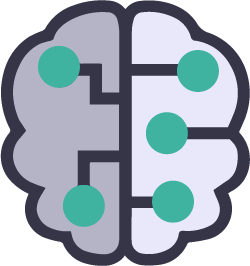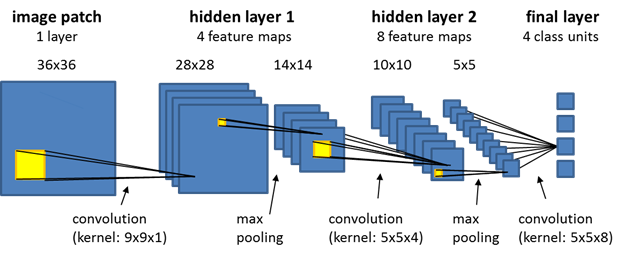
The focus of artificial intelligence (AI) is to build intelligent programs and machines that can creatively solve problems. A subset of artificial intelligence are machine learning (ML) approaches that provide the ability to automatically improve results and learn from experience - without being explicitly programmed.
Deep learning (DL), or deep neural learning - as a subset of machine learning - utilizes artificial neural networks to analyze data. The approach and architectures were inspired by insights into the functioning of the nervous system and mimics human perception.
Artificial neural networks have long been popular in machine learning, but received renewed interest when networks with many layers (referred to as deep networks) were shown to solve many practical tasks with accuracy levels not yet reached with other machine learning approaches. In the last decade, deep learning has evolved into an extensive field within research and development. In image analysis, convolutional neural networks (CNN) have been particularly successful. The term refers to a subset of neural networks with a specific network architecture, where each so-called hidden layer typically has two distinct layers: the first stage is the result of a local convolution of the previous layer (the kernel has trainable weights), the second stage is a max-pooling stage, where the number of units is significantly reduced by keeping only the maximum response of several units of the first stage. After several hidden layers, the final layer is typically a fully connected layer. It has a unit for each class that the network predicts, and each of those units receives input from all units of the previous layer.

Complex problems can be solved and objects can be recognized in images based on the Google TensorFlow ™ library - a widely used deep learning framework. Based on using eCognitions' algorithms convolutional neural networks can be created, trained and applied. eCognition can now also load third-party pre-trained semantic segmentation (pixel classification) models in TensorFlow SavedModel format.
Learn more:
Convolutional neural networks - Deep Learning Features (Reference Book)
Using Deep Learning Models / Convolutional Neural Networks (User Guide)
Webinar - Mapping of Rock Glaciers Using Deep Learning
Webinar - Deep-Learning-UAVs-and-Precision-Agriculture
eCognition tv - Tutorials and more on our website
Load convolutional neural network - load external CNN model
Apply instance segmentation - external instance segmentation model
